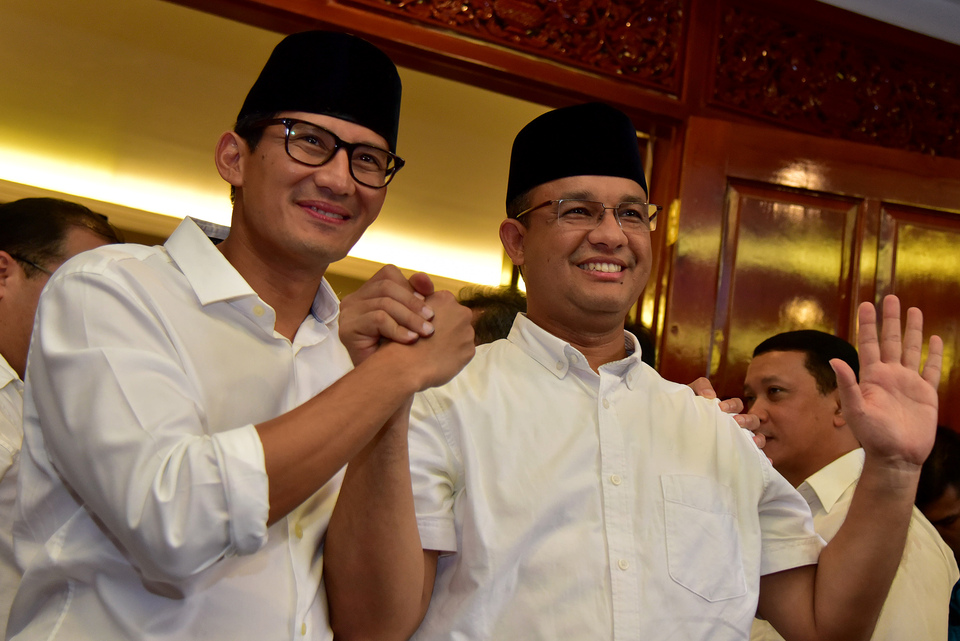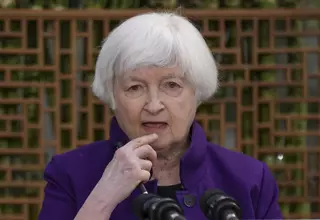Voters in Jakarta have chosen a former cabinet minister who sought the support of hardline Muslims opposing his contender – who is embroiled in a blasphemy case – as their new governor.
Anies Baswedan, who ran in the Jakarta gubernatorial race after being dismissed from his position as education minister last July, won Wednesday's (19/04) second round of voting. He received 58 percent of votes, according to a quick count of votes by several polling organizations.
Anies' candidacy was backed mainly by the Great Indonesia Movement Party (Gerindra) party chairman Prabowo Subianto and an Islamist party, the Prosperous Justice Party (PKS). In addition, the Indonesian Unity Party (Perindo), the party of Donald Trump's business partner in Indonesia, Harry Tanoesudibyo, supported Anies's candidacy in the runoff election.
Incumbent Governor Basuki "Ahok" Tjahaya Purnama, has conceded defeat.
Anies's Political Compromise
Anies won the race after seeking the support of Islamist groups that had mobilized enormous rallies demanding Ahok's imprisonment for allegedly insulting Islam. This is worrying. Anies, who was rector of Paramadina University which was founded by the late pre-eminent moderate Islamic scholar Nurcholis Madjid, had for a long time represented moderate and tolerant Islam.
However, as a challenger to an incumbent with a high approval rating, it was difficult for Anies to exploit policy issues per se. So, in his pursuit of the coveted Jakarta governor position, he approached Islamic militia groups such as the Islamic Defenders Front (FPI), which is notorious for its hardline stance and violent attacks against minorities.
This raises questions about whether Anies can keep his distance from the radical Islamic groups as leader of Indonesia's capital – and whether he would ensure that religious minorities, such as Syiah and Ahmadiyya communities and survivors of the violent 1965 anti-communist purges — groups that are often targets of attacks by hardline Islamic militias — will be protected.
It has been common in Indonesia for the state to fail to act against religious intolerance and violence. Some local governments even support intolerant acts carried out by hardline Islamic groups.
Having received the support from these groups, it may be difficult for Anies to act firmly against them. These groups want the implementation of Sharia law in Indonesia. They also often play the role as morality police by carrying out attacks and raids against, among other places, nightclubs – especially during the Islamic fasting month.
Emotion Rules Voters
The Jakarta election shows ethno-religious sentiment is a powerful instrument to mobilize voters in Jakarta. Islamists, as in some other Muslim countries, are skillful in exploiting religious sentiments to pursue their agenda.
It seems, though it needs to be further examined by available empirical data, part of the Jakarta electorate chose its leader based on emotion, rather than rationality.
According to opinion polls, more than 70 percent of the Jakarta public were satisfied with Ahok's performance as governor. Rational voters would choose a candidate based on his policies and campaign promises. Yet Ahok's favorability one week prior to the election was 46.9 percent and had never been beyond 48 percent since October 2016.
Some 90 percent of the nearly 7 million voters in Jakarta are Muslim. Ahok's double minority identities, Christian and Chinese-Indonesian, made it difficult for him to secure a majority of votes, especially after massive religious-based mobilizations against him.
Emotion then seemed to influence most voters to choose the winning candidate. Islamic groups that opposed Ahok used his criticism of his opponents for using a verse in the Koran to move people who might view Ahok as a successful leader against him.
The Islamic groups stirred voters' emotions not only through mobilizing large rallies against Ahok, but also through repeated religious sermons. This seemed to have succeeded in influencing voters.
Voters may have considered Ahok as a successful governor. But through these mobilizations, they became doubtful — or even felt averse — to Ahok.
Has Islam in Indonesia Failed a 'Litmus Test'?
The Jakarta gubernatorial election had been considered as a "litmus test" for Indonesian democracy. Muslim democrats in Jakarta, unfortunately, failed the test at this election. It seems Indonesia is still some way off seeing a Chinese governor elected in a Muslim-majority province – or as the country’s president.
The threat of rising intolerance in Indonesia is disheartening. But cooperation with hardline Islamic groups to win an election is even more worrying amid Indonesians' efforts to build a healthy and mature democracy.
The success of the Islamist groups’ strategy in stirring voters' emotions, and lifting the candidate they supported to victory, will likely be a precedent for elections in other regions in Indonesia.
If this happens, it will be difficult for Indonesia's democracy to mature. Hardline religious groups would gain ground. Indonesia will have to deal with more serious problems in managing intolerant religious groups that find allies in politicians with electoral goals in mind.
FNU Testriono is a researcher at the Center for the Study of Islam and Society (PPIM) at Universitas Islam Negeri Syarif Hidayatullah Jakarta. His views are his own.
<script type="text/javascript" src="https://theconversation.com/javascripts/lib/content_tracker_hook.js" id="theconversation_tracker_hook" data-counter="https://counter.theconversation.edu.au/content/76433/count?distributor=republish-lightbox-advanced" async="async"></script>


























